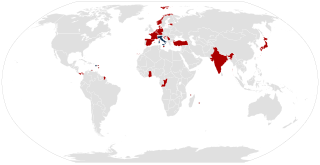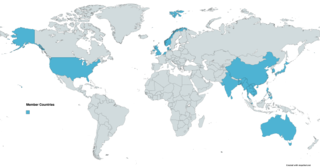Admiralty law or maritime law is a body of law that governs nautical issues and private maritime disputes. Admiralty law consists of both domestic law on maritime activities, and private international law governing the relationships between private parties operating or using ocean-going ships. While each legal jurisdiction usually has its own legislation governing maritime matters, the international nature of the topic and the need for uniformity has, since 1900, led to considerable international maritime law developments, including numerous multilateral treaties.
Shipbroking is a financial service, which forms part of the global shipping industry. Shipbrokers are specialist intermediaries/negotiators between shipowners and charterers who use ships to transport cargo, or between buyers and sellers of vessels.
A shipowner, ship owner or ship-owner is the owner of a ship. They can be merchant vessels involved in the shipping industry or non commercially owned. In the commercial sense of the term, a shipowner is someone who equips and exploits a ship, usually for delivering cargo at a certain freight rate, either as a per freight rate or based on hire. Shipowners typically hire a licensed crew and captain rather than take charge of the vessel in person. Usually the shipowner is organized through a company, but also people and investment funds can be shipowners. If owned by a ship company, the shipowner usually performs technical management of the vessel through the company, though this can also be outsourced or relayed onto the shipper through bareboat charter.
A maritime lien, in English and US law and elsewhere, is a specific aspect of admiralty law concerning a claim against a ship for services rendered to it or injury caused by it.

The Institute of Marine Engineering, Science and Technology (IMarEST) is the international membership body and learned society for marine professionals operating in the spheres of marine engineering, science, or technology. It has registered charity status in the UK. It has a worldwide membership of 21,000 individuals based in over 128 countries. The institute is a member of the UK Science Council and a licensed body of the Engineering Council UK.
Maritime security is an umbrella term informed to classify issues in the maritime domain that are often related to national security, marine environment, economic development, and human security. This includes the world's oceans but also regional seas, territorial waters, rivers and ports, where seas act as a “stage for geopolitical power projection, interstate warfare or militarized disputes, as a source of specific threats such as piracy, or as a connector between states that enables various phenomena from colonialism to globalization”. The theoretical concept of maritime security has evolved from a narrow perspective of national naval power projection towards a buzzword that incorporates many interconnected sub-fields. The definition of the term maritime security varies and while no internationally agreed definition exists, the term has often been used to describe both existing, and new regional and international challenges to the maritime domain. The buzzword character enables international actors to discuss these new challenges without the need to define every potentially contested aspect of it. Maritime security is of increasing concern to the global shipping industry, where there are a wide range of security threats and challenges. Some of the practical issues clustered under the term of maritime security include crimes such as piracy, armed robbery at sea, trafficking of people and illicit goods, illegal fishing or marine pollution. War, warlike activity, maritime terrorism and interstate rivalry are also maritime security concerns.
Nautical publications is a technical term used in maritime circles describing a set of publications, either published by national governments or by commercial and professional organisations, for use in safe navigation of ships, boats, and similar vessels. Other publications might cover topics such as seamanship and cargo operations. In the UK, the United Kingdom Hydrographic Office, the Witherby Publishing Group and the Nautical Institute provide numerous navigational publications, including charts, publications on how to navigate and passage planning publications. In the US, publications are issued by the US government and US Coast Guard.
The International Chamber of Shipping is one of the world's principal shipping organisations, representing around 80% of the world's merchant tonnage through membership by national shipowners' associations. It is concerned with maritime regulatory, operational and legal issues. Its membership includes over 40 national shipowner organisations.
The international shipping industry can be divided into four closely related shipping markets, each trading in a different commodity: the freight market, the sale and purchase market, the newbuilding market and the demolition market. These four markets are linked by cash flow and push the market traders in the direction they want.

The Hong Kong International Convention for the safe and environmentally sound recycling of ships, or Hong Kong Convention, is a multilateral convention adopted in 2009, which has not entered into force. The conference that created the convention was attended by 63 countries, and overseen by the International Maritime Organization (IMO).

The Maritime Labour Convention (MLC) is an International Labour Organization (ILO) convention, number 186, established in 2006 as the fourth pillar of international maritime law and embodies "all up-to-date standards of existing international maritime labour Conventions and Recommendations, as well as the fundamental principles to be found in other international labour Conventions". The other pillars are the SOLAS, STCW and MARPOL. The treaties applies to all ships entering the harbours of parties to the treaty (port states), as well as to all ships flying the flag of state party (flag states, as of 2021: over 91 per cent).
The International Federation of Shipmasters' Associations (IFSMA), is the international professional organisation that unites and represents the world's serving Shipmasters.

The Regional Cooperation Agreement on Combating Piracy and Armed Robbery against Ships in Asia, abbreviated as ReCAAP or RECAAP, is a multilateral agreement between 16 countries in Asia, concluded in November 2004 and includes the RECAAP Information Sharing Centre (ISC), an initiative for facilitating the dissemination of piracy-related information.

SIGTTO is the Society of International Gas Tanker and Terminal Operators. It is a not-for-profit non-governmental organisation that represents owners of gas carriers and terminals, including LNG terminals. SIGTTO was formed as an international organisation for industry participants to share technical and operational experience, to address common industry problems and derive policies for improvements in maritime operations. The Society has more than 190 members including large companies such as BP, ExxonMobil, Chevron and Shell. The organisation has Observer Status at the International Maritime Organization as an NGO. Focusing on LNG and LPG, the society is involved in the creation of publications to enhance maritime knowledge and promote safety at sea. They are actively involved in research for the use of gas as a marine fuel and publish various relevant industry guidelines. The current CEO and general manager is Ian Revell, a chartered engineer, who was appointed in September 2022.

Crew management for ships, otherwise known as crewing, are the services rendered by specialised shipping companies. Crew management services are an essential part of maritime and ship management that includes the management of all the various activities handled by crew on-board vessels, as well as related shore-based administration. Major locations where crew management activities are carried out from include Limassol (Cyprus), Singapore, Hong Kong and Malta.

The International Convention for the Control and Management of Ships' Ballast Water and Sediments is a 2004 international maritime treaty which requires signatory flag states to ensure that ships flagged by them comply with standards and procedures for the management and control of ships' ballast water and sediments. The Convention aims to prevent the spread of harmful aquatic organisms from one region to another and halt damage to the marine environment from ballast water discharge, by minimising the uptake and subsequent discharge of sediments and organisms. From 2024, all ships are required to have approved Ballast Water Management Treatment System, according to the D2 standard. Existing ships are required to install an approved system, which may cost up to 5 million USD per ship to install. To assist with implementation, the IMO has released 14 Guidance documents in regards to the Convention including the G2 Guidelines for Ballast Water Sampling, G4 Guidelines for Ballast Water management and G6 Guidelines for Ballast Water Exchange. As of 15 July 2021, 86 countries were contracting States to the BWM Convention.
Maritime Informatics is a thematic topic within the broader discipline of informatics. It is based on the use of information systems, data sharing and data analytics to increase the efficiency, safety, resilience and ecological sustainability of the world's shipping industry.
Danish shipping's counter-piracy strategy is necessary as Denmark operates one of the world's five largest shipping nations in terms of operated fleet, controlling around 10% of global shipping. At any given time, there are approximately 70 Danish-controlled ships in the Indian Ocean and 30 ships in the Gulf of Guinea. This makes piracy in these areas is a significant concern for the Danish shipping industry and for the Danish state. In 2012, when Somali piracy was at its height, the piracy cost of Danish shipping was estimated to be between 130 and 260 million Euros.
The UK P&I Club is a marine mutual liability insurer in the United Kingdom providing P&I insurance for the global shipping industry. The UK P&I Club is one of the 12 members of the International Group of P&I Clubs. The club is one of the largest of the global P&I Clubs and in 2002 covered more than 100 million tons across 6,000 ships. In 2019, the Club provided insurance for over 144 million gross tons of merchant shipping.









